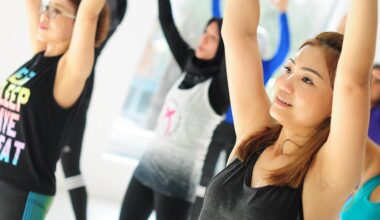Building Resilience Through Adaptive Fitness in Mental Health Recovery
Adaptive fitness plays a vital role in mental health recovery, as it helps individuals build strength and resilience. By participating in adaptive fitness programs, people with disabilities can enhance their mental well-being while gaining physical fitness. These programs are designed to be inclusive, ensuring that everyone, regardless of their abilities, can engage in activities that suit their needs and preferences. The key facets of adaptive fitness include personalized training, supportive environments, and the use of modified equipment. Experts emphasize that regular physical activity significantly contributes to better moods, reduced anxiety, and improved self-esteem. Furthermore, engaging in group classes can help foster a sense of community, reducing feelings of isolation that often accompany mental health struggles. Implementation of variety in exercises also keeps participants motivated and excited, as activities may range from yoga to resistance training. As we explore adaptive fitness further, it is essential to recognize the mental health benefits gained from enhanced physical capabilities, encouraging a holistic approach to well-being and recovery. One of the primary goals in mental health recovery is to establish coping strategies that allow individuals to overcome challenges through consistent physical engagement.
The Importance of Tailored Programs
Successful adaptive fitness programs cater to individual needs, recognizing that every person’s mental health journey is unique. Tailoring fitness activities not only aids inclusion but also ensures effectiveness in addressing varied challenges associated with mental health issues. Trained professionals create specific programs that consider individuals’ physical abilities, emotional states, and personal preferences. This tailored approach helps build confidence, as participants often feel that their specific requirements are acknowledged and addressed. Adaptive programs might include gentle chair exercises, aquatic therapy, or more dynamic workouts, which all cater to different capabilities. Additionally, participants can also learn valuable skills such as teamwork, communication, and resilience, all of which are translatable to daily life. Many individuals report feeling empowered after taking control of their physical health, leading to positive changes in their mental health as well. As participants witness improvement in their fitness levels, they also build a stronger sense of self. The increased physical strength often translates into emotional strength, illustrating the intrinsic link between body and mind. Ultimately, tailored fitness programs ensure that therapeutic benefits are attained, yielding significant returns in mental health recovery processes.
Setting realistic, achievable goals is another cornerstone of adaptive fitness in mental health recovery. Participants are encouraged to define their own goals, allowing them to invest not just physically but emotionally in their fitness journey. These goals can range from simple objectives, such as completing a certain number of repetitions, to more complex achievements like participating in community sports events. By adopting a goal-oriented mindset, individuals instill a sense of purpose that can act as motivation throughout their recovery process. Moreover, celebrating small achievements fosters an environment of positivity, helping individuals to remain focused on their progress instead of setbacks. This mindset can radically change the perspective on challenges faced during recovery. Additionally, support systems from trained professionals and peers play an essential role in maintaining accountability and encouragement. As individuals work towards their personal goals, they often foster camaraderie, building relationships that extend beyond workout sessions. This sense of community can be particularly beneficial for people dealing with isolation, providing a platform for positive social interaction. The construction of personalized fitness plans based on sole prospective views is what makes adaptive fitness a cornerstone of psychological healing.
Integrating adaptive fitness within mental health care encourages a comprehensive approach to treatment. It recognizes that mental health is not solely a psychological issue but deeply intertwined with physical well-being. Healthcare providers increasingly advocate for incorporating fitness routines as a part of therapeutic strategies. When mental health professionals and fitness trainers collaborate, they can create holistic plans benefiting individuals both mentally and physically. These collaborations can pave the way for more innovative therapeutic approaches, as both teams can share insights from their fields. Mental health care plans that emphasize physical activity are gaining traction, highlighting the importance of an active lifestyle in achieving recovery. Moreover, adaptive fitness can reduce the stigma associated with mental health issues by showcasing the capabilities of individuals. As they thrive in adaptive programs, participants proudly display resilience and determination, challenging existing stereotypes linked to disabilities or mental illnesses. The visibility of success stories within adaptive fitness fosters understanding and acceptance. Furthermore, those engaged in adaptive fitness move towards an improved quality of life, thus embodying the idea that with the correct support, recovery is entirely attainable and any individual has limitless potential.
The Role of Community Support
Community support becomes instrumental in shaping adaptive fitness experiences, enhancing the effectiveness of recovery efforts. Engaging with supportive communities encourages individuals to remain committed to their fitness goals. Community involvement may vary from local fitness classes to peer support groups, creating an environment that fosters mutual encouragement and shared experiences. These connections often lead to friendships that help sustain motivation over time. Individuals in supportive spaces tend to have better adherence to their fitness commitments, resulting in improved mental health outcomes. Those who feel supported are more likely to engage regularly in activities, seeing fitness not as a chore but as an enjoyable, fulfilling part of their lives. Celebrating community events such as fitness challenges or workshops opens up opportunities for involvement through engaging activities, further enhancing social bonds. Sharing personal challenges and triumphs helps participants to realize they are not alone, effectively reducing feelings of isolation that can magnify mental health struggles. Adaptive fitness thus transforms not only physical well-being but also enhances emotional stability through community engagement, creating a ripple effect of positivity that spans across members of the community.
Adapted fitness influences mental health by teaching essential life skills such as perseverance, adaptability, and stress management. These skills, developed through physical activities, empower individuals to tackle everyday challenges with resilience. Participants often find themselves refining their approaches when faced with obstacles, whether in fitness routines or personal situations. For example, mastering a complex exercise can mimic the process of handling unexpected life changes, emphasizing the importance of flexibility in strategies. As individuals practice these valuable skills, they begin applying them beyond the fitness environment. The culmination of progress over time reinforces the idea that improvement is always within reach. Participants learn to face fears head-on, overcoming anxiety through proactive engagement in fitness activities tailored to their specific abilities. This sense of empowerment can also lead to improved self-awareness. With a more profound understanding of their strengths and weaknesses, individuals become capable of making healthier choices in all areas of life. Moreover, sharing these experiences often inspires others, fostering a supportive atmosphere within adaptive fitness environments that encourages continuous growth, thus creating a positive feedback loop that uplifts everyone involved.
Advocacy and Resources
Ensuring access to adaptive fitness programs requires continuous advocacy and resource allocation. Organizations devoted to adaptive fitness are crucial in raising awareness about the importance of physical activity for mental health recovery. These organizations can provide crucial resources, including training, workshops, and funding to facilitate access to adaptive programs. Furthermore, collaboration with local governments can enhance community outreach efforts, ensuring that underrepresented populations are informed about available fitness opportunities. Increasing visibility of adaptive athletes promotes inclusivity, challenging societal norms around disabilities, and changing perceptions of what individuals can achieve. Resources like informative webinars and local fitness events can serve as platforms to educate both the public and health professionals on adaptive fitness’s significance. By highlighting success stories, these advocacy efforts can further inspire individuals who may benefit from engaging in adaptive fitness programs. Public campaigns aimed at improving mental health awareness often intertwine with physical health, showcasing the regulatory elements producing lasting positive outcomes. Overall, the goal is to cultivate a supportive environment that champions adaptive fitness as an integral component of mental health recovery strategies, showing that everyone deserves the chance to thrive both physically and mentally.
In summary, building resilience through adaptive fitness has the potential to revolutionize mental health recovery. By focusing on individualized approaches, community engagement, and necessary advocacy, adaptive fitness presents a pathway toward enhanced well-being. It allows individuals to embrace their abilities, redefining personal perceptions and building confidence while promoting psychological healing. The stronger mind-body connection fostered through fitness activities highlights the overarching benefits of a balanced lifestyle. Participants not only enhance their physical capabilities but also develop essential emotional skills that lead to greater resilience in life. Continuing to strive for accessibility in adaptive fitness will enable more individuals to partake in these influential programs. Moreover, cultivating supportive communities where individuals share experiences and motivate each other can further strengthen recovery processes. The prospect of integrating adaptive fitness into standard mental health care offers transformative opportunities for personal growth and empowerment. By dismantling stigma and paving the way for awareness, advocacy will play a pivotal role in shaping future opportunities in adaptive fitness. Ultimately, invested efforts in promoting adaptive fitness will yield promising results, showcasing the powerful influence of this approach on mental health recovery and overall life satisfaction for individuals with disabilities.





